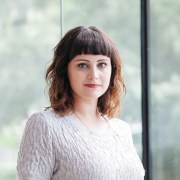Meet at Experimentarium’s iconic helix staircase for an unusual best practice sharing session on the topic of student internships. Moving up and down the stairs, participants from the museum, science centre and academic world will engage in brief speed dating discussions, sharing valuable information on the following subthemes: what makes a good preparation; how we can maximise learning; how to facilitate exchange of information and experiences; motivation and expectations; and co-creation with students.
During the speed dates we will gather tips and hints on these subthemes, and report back in a plenary exchange at the end of the session. We are hoping many of you will to join us.
Facilitator
Session legacy
Session legacy – A series of speed dates to talk about student internships on Experimentarium’s Helix staircase (Thursday 6 June 2019: 16.30 – 17.45 hrs)
Tips and hints within 4 minute speed dates on the following sub themes:
1. what makes a good preparation (theme owner Nancy Longnecker);
2. how we can maximise learning (theme owner Mairead Hurley);
3. how to facilitate exchange of information and experiences (theme owner Derek Fish);
4. motivation and expectations (theme owner Carina Bammesberger);
5. co-creation with students and visitors (theme owners Nele Van der Elst and Thomas Bjorneboe Berg).
Legacy - Good preparation:
1. When you have diverse students – try to prepare them ahead of time, so to have some seasonal workshops. This can be done either by their educational programme but also by the internship organization.
2. Try to work with them at their different levels on communication skills.
3. As the internship organization is it good to figure out before the interns come whether the professors have a list of aims at their university or educational programme, so you can focus on those aims in the museum during the internship.
4. If possible, try to coax and support your interns into forming a community. Make use of peer feedback. Share experiences. Give peer support so that they maintain their enthusiasm.
Legacy - Maximise learning:
1. Set up training programmes for the trainees. Trainees feel invested in and try harder to make the most of their internship and to maximise learning. What also helps is showing that senior staff is involved and interested in interns, that they make supervision and support of interns a priority.
2. A tip for the training programmes themselves – make them flexible. Online training modules seem to be appreciated. And if needed, invest in preparative training before the internship, and in courses for while they are actually working in the museum / centre.
3. It would be great if we could invest more in researching learning outcomes, for instance, measuring attitudinal changes of interns between start and end of internship, or measuring personal development and learning itself.
Legacy - Facilitating exchange:
1. In my conversation with Alyse we found that a common worry was: where do you draw the line with treatment of interns? In South Africa the students (graduates) who come into our science centre have had some deceptions. So you initially treat them nice but in the workplace it’s not always nice, so a what moment, at what stage do you expose them to ‘the sometimes harsh reality of working life?’ We didn’t find a clear answer to that question in under 5 minutes.
2. Freddy surprised me by saying they offered 100s of different workshops all the time. His main worry was how to get interns on top of them and make sure they perform well. Another very complex but interesting question.
3. Lucas gave me an interesting tip: at the Experimentarium they give prospective interns a glimpse of what it would be like to be an intern in the Experimentarium. Then one or more years later they can make a well-founded decision on actually becoming an explainer or not.
Legacy - Motivation and expectation:
1. For many students real work experience and getting to know how it works on the inside, in the museum on the work floor, is what motivates them to do an internship.
2. At the Neanderthal Museum we have a continuous offer of students willing to become an intern with us but one speed dater asked: How can I motivate students to be our intern? Suggestions that came up were: Be clear about what they can learn in an internship at your organization. Maybe (a little) payment would help?
3. Sometimes interns are there for such a short period, it is difficult to find something worthwhile for them to do. One potential solution is to find ways to divide up a bigger project and then give student small tasks that they can do in a relatively short period of time, and still give them the feeling that they have done something relevant that contributes to a far greater whole.
Legacy - Co-creation
1. Our job students co-create on a daily basis with visitors, and amongst each other. They come up themselves with projects to work on. At Technopolis we just ask our job students: ”What can you add, what is your specialism and your added value?” They come up with things you never thought about yourself.
2. Same happens while co-creating with the public. Their input on interesting research topics was surprising. We did a reverse science café to gather tips about questions that the public may have.
3. We have a big variety in education levels amongst our interns and also paid students. By inviting them to co-create some become so interested in what we do, that they decide to join exhibition development or research projects on a voluntary basis.






